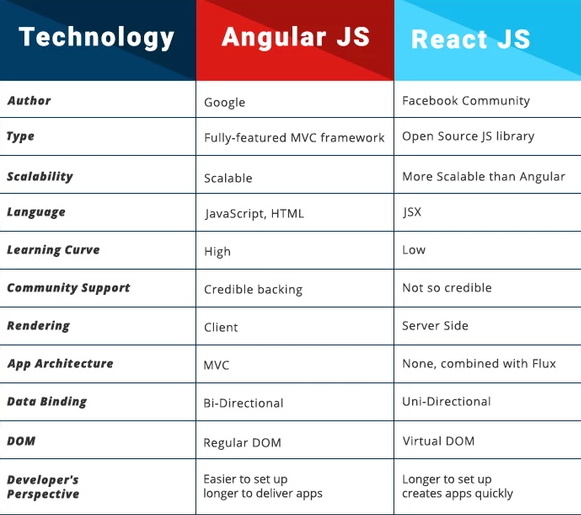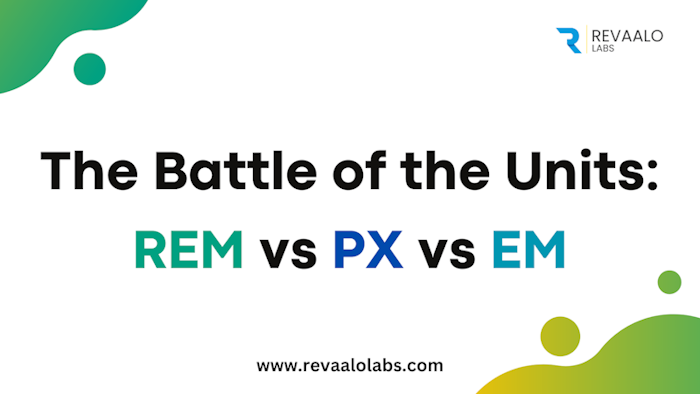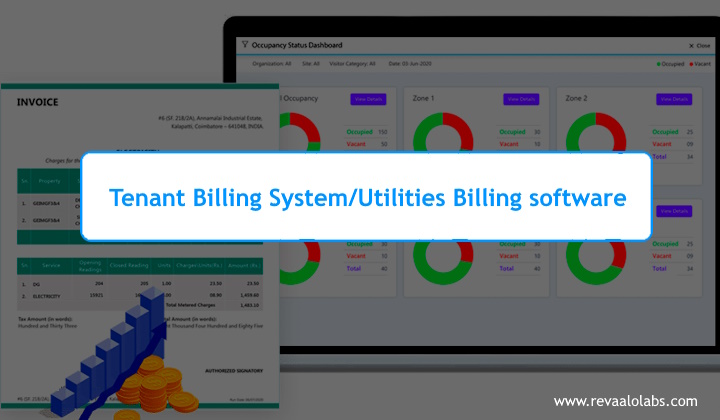#AngularJS #ReachJS #WebDevelopment #Software

ReactJS and AngularJS are both highly developed as well as extensively adopted JavaScript (JS) technologies in the marketplaces. The two development technologies are continually growing and giving tough competition to each other in the industry.
There is a considerable amount of debate on whether AngularJS or ReactJS is a smarter choice for front-end development. ReactJS and AngularJS are robust development technologies. Angular is designed and managed by Google, while Facebook and its community maintain ReactJS. They are built on JavaScript that clubs advancement and customization to develop advanced web applications.
What is AngularJS?
AngularJS is a client side JavaScript MVC framework to develop a dynamic web application. AngularJS was originally started as a project in Google but now, it is open source framework. It is entirely based on HTML and JavaScript, so there is no need to learn another syntax or language.
Benefits of Angular:
1. Angular offers new features like enhanced RxJS, really fast compilation (in under 3 seconds), and a new HttpClient launch.
2. Two-way data binding that enables singular behavior for the app minimizes risks of possible errors.
3. Dependency injection of the features related to the components with modules and modularity in general.
4. MVVM (Model-View-ViewModel) allows developers to work separately on the same app section using the same set of data.
5. Detailed documentation that allows effective communication and collaboration between developers, although this has a learning curve.

What is ReactJS?
ReactJS is an open-source JavaScript library that is used for building user interfaces specifically for single-page applications. It’s used for handling the view layer for web and mobile apps. React also allows us to create reusable UI components. React was first created by Jordan Walke, a software engineer working for Facebook. ReactJS is also called simply to React or React.js.
Benefits of ReactJS:
1. 100% open-source JavaScript library with a highly engaged contributor community, resulting in speedy updates and solutions.
2. Easy to learn. React is extremely easy to learn because of its simplified syntax. With their HTML writing skills, developers can easily write in React. No need to learn TypeScript deeply like in Angular.
3. Combined with ES6/7, ReactJS can work with heavy loads with relative ease.
4. Migrating between versions is generally very easy, with Facebook providing “codemods” to automate much of the process.
5. Extremely responsive and flexible.
ReactJS or AngularJS: Who Wins the Battle?
1. Scalability:
AngulaJS:- Powered with a robust CLI and design paradigms, AngularJS web application development offers significant scalability.
ReactJS:- Undoubtedly, ReactJS offers higher scalability as compared to AngularJS. Thus, the code can be easily tested and deployed.
2. Simplicity:
AngularJS:- In case of AngularJS, developers do not face much hassle while understanding. It is pretty simple and easy regardless of the inherent complexity which at times, increases the confusion.
ReactJS:- This framework is not simple by any mean and requires some time frame to set up.
3. DOM Manipulation:
AngularJS:- Following two-way data binding while updating MVC, AngularJS updates the Real DOM.
ReactJS:- React is all about components. Instead of updating the real DOM, it manipulates the virtual DOM to facilitate one-way data binding.
4. Development Time:
AngularJS:- While Angular is very much competitive, the complex syntax even to take upon simple things put AgularJS among the last one in the list.
ReactJS:- ReactJS application development takes up lesser time despite its long installation process. Moreover, it is relatively easy to add new features.
5. Library Compatibility:
AngularJS:- Framework would have scaled better on this parameter if it could have avoided TypeScript that needs a definition for every library.
ReactJS:- Despite that, it doesn’t use Real DOMs, ReactJS uses pure JavaScript logic. Additionally, even the DOM-based libraries have their alternatives when it comes to ReactJS.

When to use React Vs Angular?
Choosing Angular framework is the best option when you hire Angular developers that are experienced in C#, Java and previous versions of Angular. If the app solution you want to develop has the complexity that is low to medium level, needs to be a large-scale feature rich and requires higher productivity, Angular is the perfect option.
Meanwhile, React is the right choice for you if your team is well-versed in CSS, HTML and JavaScript. If the app you need to develop is a highly-customized specific solution and needs various components of diverse, variable states (enabled/disabled buttons, user login/access permission or active/inactive navigation items), React is the best for development of such solution.
Connect with Revaalo labs for all your Machine Learning needs

One of the most critical decisions website developers must make is deciding what unit of measurement to use when sizing elements, fonts, and other design properties.
Read more
It`s an amazing technology-one that will help us solve society`s toughest problems and reshape the world.
Read more13
December

Today, web browsers play a significant role in our lives, providing us with access to a world of information and possibilities.
Read more
Power BI is a popular business intelligence tool developed by Microsoft for data visualization and analysis. While Power BI is a robust solution, there are several alternatives available that cater to different needs and preferences.
Read more09
October

Tenant billing systems are software solutions used by property owners, managers, and landlords to accurately bill tenants for their usage of utilities and services.
Read more